-
_110_86_90.jpg)
Climate Change and Future Generations
Efforts to reduce greenhouse gases and control climate change implicate a wide range of social, moral, economic, and political issues, none of them simple or clear. But when regulators evaluate the desirability of climate change mitigation through cost-benefit analysis, one factor typically determines whether mitigation is justified: the discount rate or the rate at which future benefits are converted to their present value.
This working paper evaluates the four principal justifications for intergenerational discounting, which often are conflated in the literature. It shows that none of these justifications supports the prevalent approach of discounting benefits to future generations at the rate of return in financial markets and, more generally, that discounting cannot substitute for a moral theory setting forth our obligations to future generations.
-
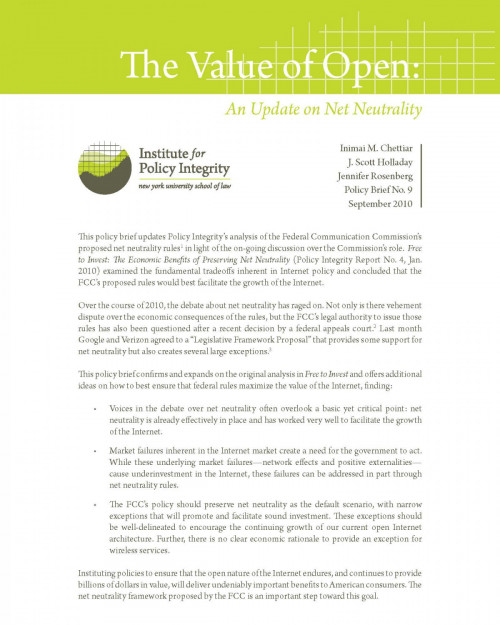
The Value of Open
An Update on Net Neutrality
An open Internet allows anyone with an idea and a domain name to add content to the web for all to use. It’s a system that most believe works very well, generating billions in economic benefits for the American public every year. This policy brief analyzes the economic uncertainties of weakening our current, open Internet and sees potential trouble ahead if it is not preserved.
-
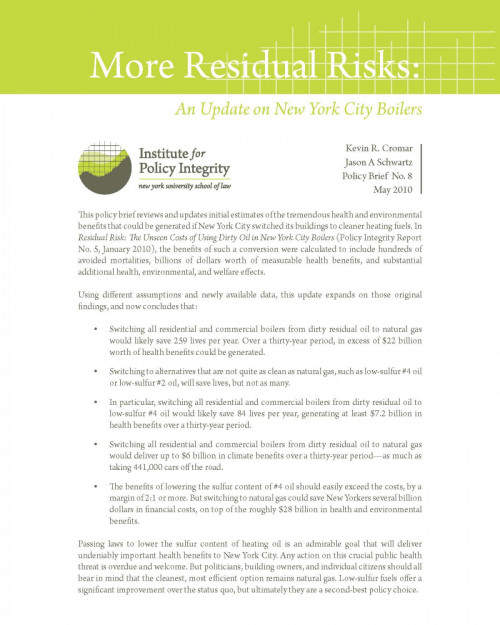
More Residual Risks
An Update on New York City Boilers
Up to 259 lives could be saved every year if certain large buildings in New York City stopped burning dirty heating oil. Using newly available data, a reworked analysis finds that residual oil has even greater consequences than estimated in an earlier report.
-
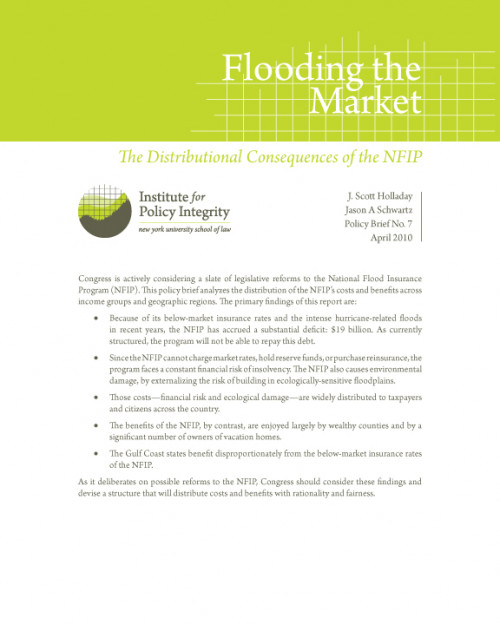
Flooding the Market
The Distributional Consequences of the NFIP
The government’s flood insurance program gives discounts to homeowners who build in flood-prone areas, often causing significant environmental damage. In this analysis, the Institute for Policy Integrity finds that this practice can benefit wealthy owners of expensive homes at a cost to the average taxpayer.
-
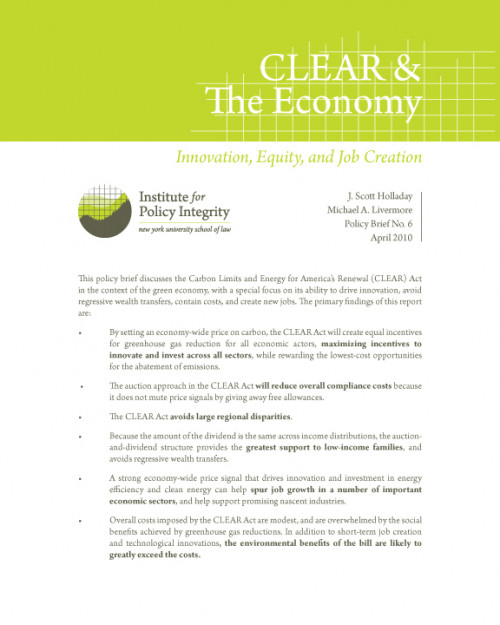
CLEAR & The Economy
Innovation, Equity, and Job Creation
The CLEAR Act, sponsored in the Senate by Maria Cantwell (D-WA) and Susan Collins (R-ME), would place a price on carbon, auction 100% of the pollution permits, and refund most of the revenue back to consumers. This brief found that pricing carbon would spur investment and innovation in new energy technologies, giving a substantial boost to industries like manufacturing and construction—both hit hard in the recent financial crisis. Relatively well-paying jobs would be generated in these sectors, helping to mop up the slack created by the recession.
-
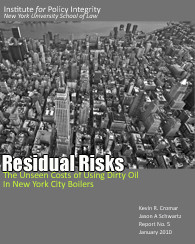
Residual Risks
The Unseen Costs of Using Dirty Oil in New York City Boilers
In about 9,000 big apartment and commercial buildings in Manhattan, Brooklyn, Queens, and the Bronx, boilers burn a dirty fuel to heat their units. “Residual Risks” analyses the health, environmental, and economic benefits of switching away from this dirty fuel to cleaner alternatives like natural gas.
-
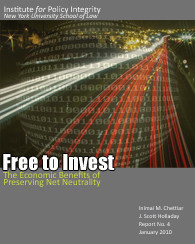
Free To Invest
The Economic Benefits of Preserving Net Neutrality
It is hard to imagine a future where the value of the Web takes a downward spiral: where less content is created, online access is less useful, and fewer people log on. In Free to Invest, the Institute for Policy Integrity warns of negative economic consequences if net neutrality is weakened. The report arrived at five main findings that describe the trade-offs of revoking net neutrality.
-
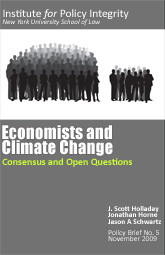
Economists and Climate Change
Consensus and Open Questions
Economists and Climate Change: Consensus and Open Questions describes and analyzes the results of a survey sent to 289 economic experts on climate change. Over 84% of the respondents to the poll said that the effects of global warming will create significant risks to important sectors of the United States and global economies.
-
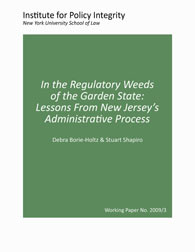
In the Regulatory Weeds of the Garden State
Lessons From New Jersey’s Administrative Process
There is a dearth of studies about the effects of the proceduralization of the rulemaking process on state regulations. In the Regulatory Weeds of the Garden State focuses on regulations promulgated in New Jersey, both prior to and following major procedural changes enacted in the state in 2001.
-
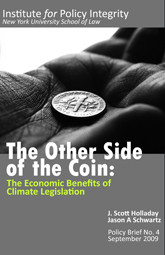
The Other Side of the Coin
The Economic Benefits of Climate Legislation
This brief compiles estimates from several different federal agencies, and calculates that the economic benefits of the emissions cap in the Waxman-Markey bill likely dwarf the costs by as much as 9-to-1 or more. The benefit to cost ratio was determined using the EPA’s previously released (and peer reviewed) cost estimates and a newly released “social cost of carbon” estimate from an interagency process which provides a conservative dollar figure for the benefits of greenhouse gas reductions.
Viewing recent projects in Publications
